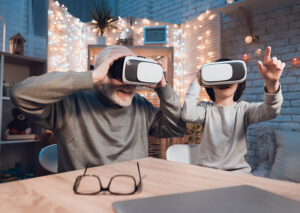December 21, 2021

Learn how virtual reality is helping dementia patients make connections to the past.
Imagine for a second how it could feel to grapple with the cognitive challenges of Alzheimer’s. The family and friends who are closest to you are no longer familiar. The words and phrases that would roll off your tongue without a second thought are now just beyond your grasp. In fact, the world as you once knew it has turned completely topsy-turvy, leaving you yearning for a familiar foothold.
One of the kindnesses imparted by Alzheimer’s is the long-term memories that frequently remain intact long after short-term memories have disappeared. It’s why connecting older adults with dementia to the past is often a remarkably effective way to engage them – through music, movies, photos, and reminiscing. We can now add a high-tech tool to the possibilities for how we can help seniors mentally connect with the past that’s showing remarkable results in dementia patients: virtual reality.
Skip Rizzo, director for medical virtual reality at the USC Institute for Creative Technologies, has been using the technology to aid veterans experiencing PTSD. He is now expanding his reach to seniors – beginning with his own 89-year-old mother, whose wonderful response to a virtual visit to Rome showed just how effective the technology can be for older adults.
Rizzo relays an encounter in which he visited a care home where a group of residents were simply sitting around a table in silence, until he began showing them flashcard-like pictures of objects from the past. The transformation within the atmosphere was electric, as the seniors began sharing memories with each other. With the potential of low-tech tools such as simple photographs to produce joy for seniors, imagine the possibilities available to us now with high-tech solutions like virtual reality!
The advantage of virtual reality for seniors goes further than merely bringing enjoyment and boosting memory, such as:
Improved Medical Care
The distraction of virtual reality is proving to be a highly effective tool for reducing physical pain for older adults. It can also be used to enhance balance and other motor skills and improve spatial reasoning. It can even help doctors detect health issues by seeing how older adults respond in various activities and games.
Heightened Socialization
We know that senior isolation is a contributing factor in a variety of physical and mental health problems. A recent research study by the National Academies of Sciences, Engineering and Medicine announced that approximately one in four seniors feel socially isolated. To address this concern, AARP Innovation Labs has created an app called Alcove, in which older adults and their family and friends can enjoy virtual reality experiences together.
Would you like to learn more creative options to improve quality of life for a senior you love? Reach out to Continuum, provider of home care in St. Louis and nearby communities, at (314) 863-9912 or (636) 861-3336 to learn more!
